Overview
Understanding the importance of multivitamins for our children's health is essential. These nutrients play a vital role in filling the nutritional gaps that can occur in their diets. While multivitamins can support your child's growth and development, it's crucial to remember that they should complement a balanced diet.
You might be wondering how to ensure your child is getting the right nutrients. It's important to consult healthcare professionals who can provide tailored advice on supplementation. Together, we can navigate this journey towards better health for our little ones. Remember, you're not alone in this; seeking guidance is a proactive step in supporting your child's well-being.
Introduction
Understanding the nutritional needs of our children is crucial, especially as many young ones face dietary gaps that can hinder their growth and development. Imagine if your child could thrive with the right nutrients!
With a significant percentage of U.S. youth turning to dietary supplements, multivitamins have emerged as a popular solution for parents seeking to ensure their children receive essential nutrients.
But you might be wondering: do kids truly need multivitamins? How can parents navigate the myriad of options available?
This article delves into the vital insights surrounding multivitamins for kids, exploring their benefits, potential side effects, and the importance of consulting healthcare professionals to support our children’s health effectively.
Together, we can make informed choices for their well-being.
It Works! Multivitamins for Kids: Quality Nutrition for Growing Bodies
It Works! offers a range of dietary supplements specifically designed for children, ensuring they receive the vital nutrients necessary for their growth and development. Crafted with high-quality, natural ingredients, these supplements promote overall health. With the rise in dietary supplement use among minors—34% of U.S. youth and adolescents reported utilizing them, including 39.9% of non-Hispanic White and 41.1% of non-Hispanic Asian minors—It Works! emerge as a trustworthy choice for parents striving to fill nutritional gaps caused by selective eating or busy schedules.
Imagine if you could help guarantee that your kids obtain the essential nutrients they need to thrive by providing a multivitamin for kids. By incorporating a multivitamin for kids into their diets, parents can support their children’s health and well-being. Many parents have shared success stories, noting improvements in their children's energy levels and overall health after adding It Works! vitamin supplements. For instance, Taylor Wallace, Ph.D., emphasizes that a daily vitamin can provide crucial nutrients for cognitive growth, positioning It Works! as a reliable ally in youth nutrition.
You might be wondering how to approach this effectively. It’s advisable for parents to consult with pediatricians before introducing a multivitamin for kids into their child's routine. This ensures that your approach to nutrition is both safe and effective, allowing you to nurture your child's health with confidence. Together, we can support our children's wellness journey.
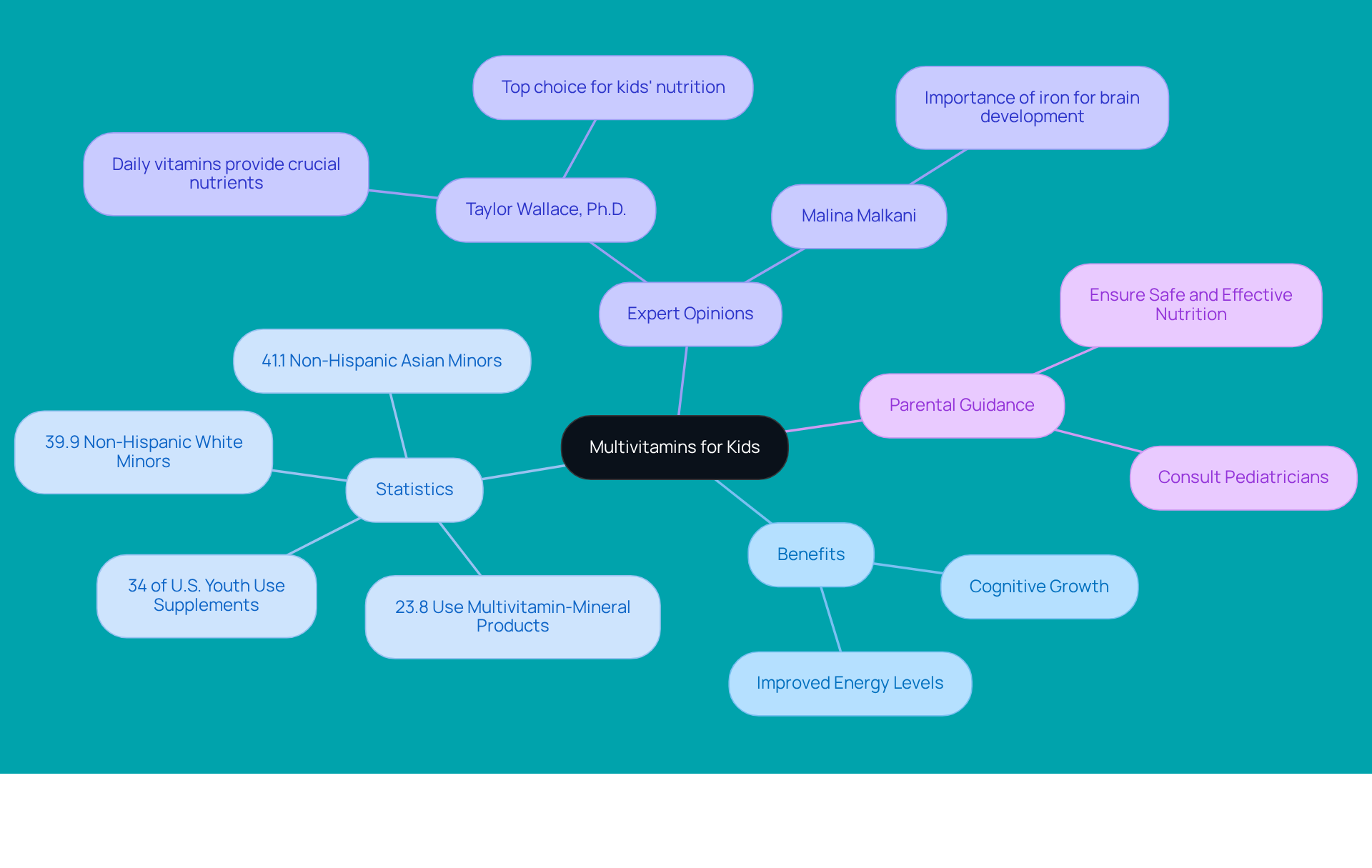
Key Nutrients in Multivitamins: What Your Child Needs
When it comes to our children's health, ensuring they receive key nutrients is essential. A multivitamin for kids typically includes vitamins A, C, D, E, and several B group elements, along with vital minerals like calcium, iron, and zinc. Vitamin A supports vision and immune function, while vitamin C is crucial for skin health and immune support. Imagine if your child could benefit from vitamin D, which is vital for strong bones, alongside B vitamins that play a significant role in energy metabolism. Calcium and iron are equally important, helping to develop robust bones and healthy blood, respectively.
Choosing a quality multivitamin for kids means looking for options that include calcium, vitamin D, and iron, all without synthetic flavors or excessive sugar. However, it's important to remember that a multivitamin for kids should complement, not replace, a healthy diet. You might be wondering how to navigate this—consulting with a healthcare provider for personalized advice on youth supplements can be a great step forward.
Did you know that studies show roughly 17% of teenagers experience a lack of vitamin D? Additionally, around 35% of youth and adolescents in the U.S. take at least one vitamin supplement. By ensuring that young individuals receive these essential nutrients, we can significantly influence their overall health and development. Together, let’s , nurturing their growth every step of the way.

Do Kids Really Need Multivitamins? Understanding the Necessity
While a balanced diet is the ideal source of nutrients, many youngsters fall short of the recommended intake of fruits, vegetables, and whole grains. You might be wondering why this happens. Factors such as selective eating, food restrictions, and hectic schedules contribute to nutritional deficiencies that can affect our children's well-being. Research shows that about , emphasizing the necessity for further assistance.
Imagine if you knew that 34.0% of U.S. children and adolescents aged ≤19 years take dietary supplements. This indicates a common reliance on vitamin supplements to help fill those gaps. In such cases, vitamin supplements can act as a safety net, ensuring our children receive the essential nutrients vital for their growth, development, and overall health.
However, it is crucial to evaluate each child's dietary habits and specific needs to determine whether supplementation is warranted. Most healthy children do not need vitamin supplements if they are growing at a typical rate and eating a variety of foods. For children with picky eating habits or those following restrictive diets, vitamin supplements may be particularly beneficial in bridging the nutritional gap.
If you are considering vitamin supplements for children with specific health concerns, consulting a pediatrician is advisable. Together, we can ensure our children thrive and receive the care they deserve.
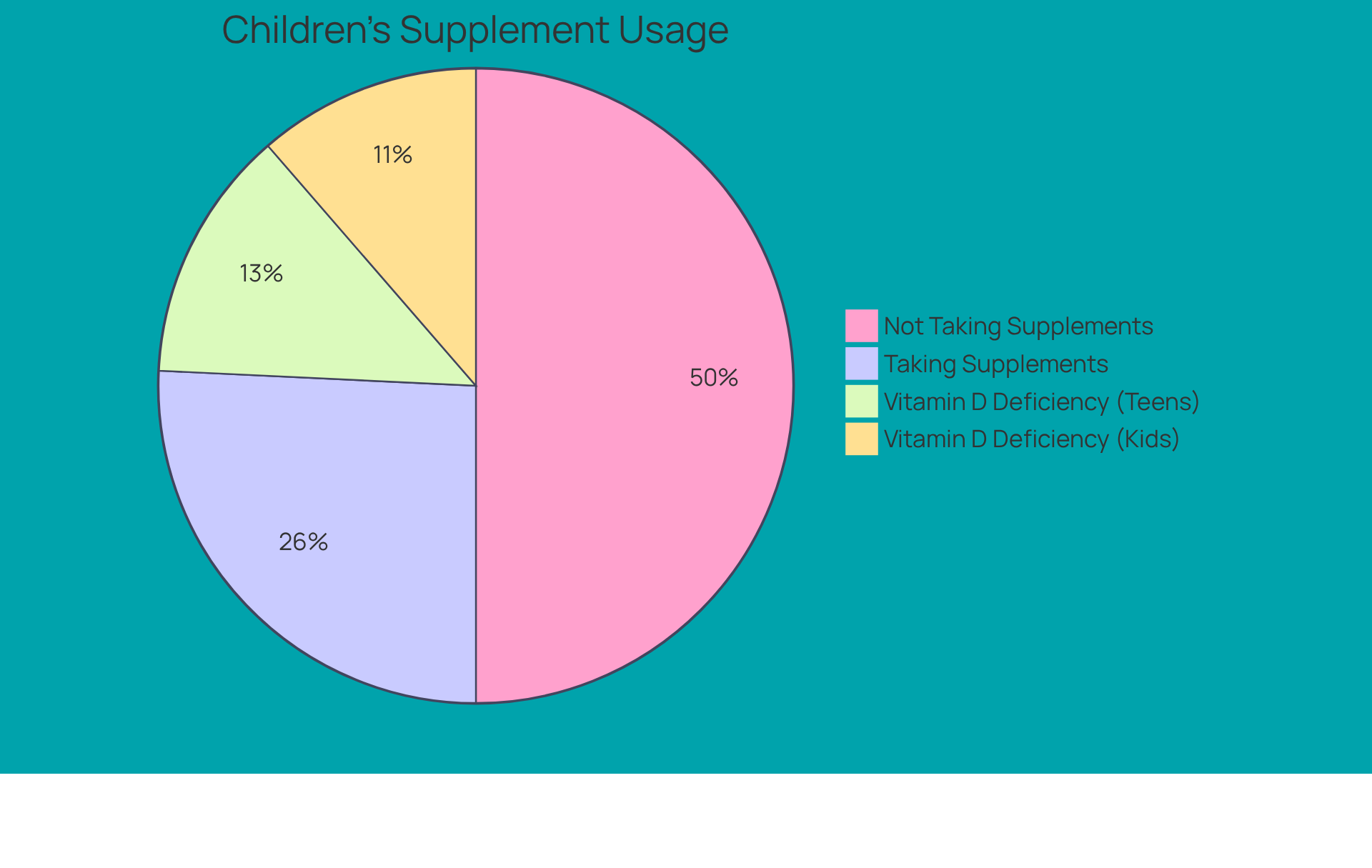
Choosing the Right Multivitamin: A Parent's Guide
When it comes to choosing a multivitamin for kids, it's essential to consider several important factors. You want to ensure that the formulations are age-appropriate, contain , and are free from artificial additives or allergens. Imagine how reassuring it would be to find products that have been thoroughly tested for quality and efficacy. By reading labels carefully and discussing your options with healthcare experts, you can feel confident that the selected multivitamin meets your child's unique needs.
Additionally, think about your child's preferences, such as their favorite flavors and forms—whether they prefer gummies, chewables, or tablets. This consideration can greatly encourage regular usage and make the experience more enjoyable for them. Together, let’s take the next step in supporting your child’s wellness journey by making informed choices that prioritize their health and happiness.

Potential Side Effects of Multivitamins: What to Watch For
A multivitamin for kids is generally considered safe for children, which is reassuring for many parents. However, it’s important to note that some children may experience mild side effects, such as stomach upset, nausea, or constipation. You might find that taking the supplement with food can often alleviate these reactions. Yet, it’s crucial to be aware that of specific nutrients and minerals can lead to toxicity, a serious concern for caregivers.
For instance, did you know that too much vitamin D can result in symptoms like nausea and abdominal discomfort? This highlights the need for careful dosage management. In fact, a staggering 75% of calls related to vitamin D incidents involve children under the age of 15. This statistic underscores the importance of monitoring your child's intake of vitamin supplements closely.
As parents, it’s advisable to adhere strictly to recommended dosages for multivitamin for kids and consult healthcare professionals if any adverse effects arise. The American Academy of Pediatrics suggests that healthy youngsters on a balanced diet typically do not require additional nutrient supplementation beyond the recommended dietary allowances (RDA). Therefore, it’s essential for caregivers to provide a variety of nutritious foods and to discuss the inclusion of a multivitamin for kids with a pediatrician to tailor the approach to individual needs.
Additionally, be cautious of gummy vitamins, which can easily be mistaken for candy, leading to accidental overdoses. Together, we can ensure our children receive the nutrition they need while keeping their health and safety a top priority.

Boosting Immunity: The Role of Multivitamins for Kids
Multivitamins can truly make a difference in supporting the immune health of our young ones. You might be wondering how to help your child stay healthy, especially during cold and flu season. , along with zinc, play particularly vital roles in immune function. For instance, vitamin C helps stimulate the production of white blood cells, which are essential for fighting infections. Meanwhile, vitamin D enhances the pathogen-fighting effects of monocytes and macrophages—two types of white blood cells that are crucial for immune defense.
Imagine if you could ensure your child receives sufficient quantities of these important nutrients through dietary supplements. By doing so, you can help strengthen their immune system, providing them with the support they need. Together, we can take proactive steps to nurture our children's health and well-being. Let's make sure they are equipped to face whatever comes their way!
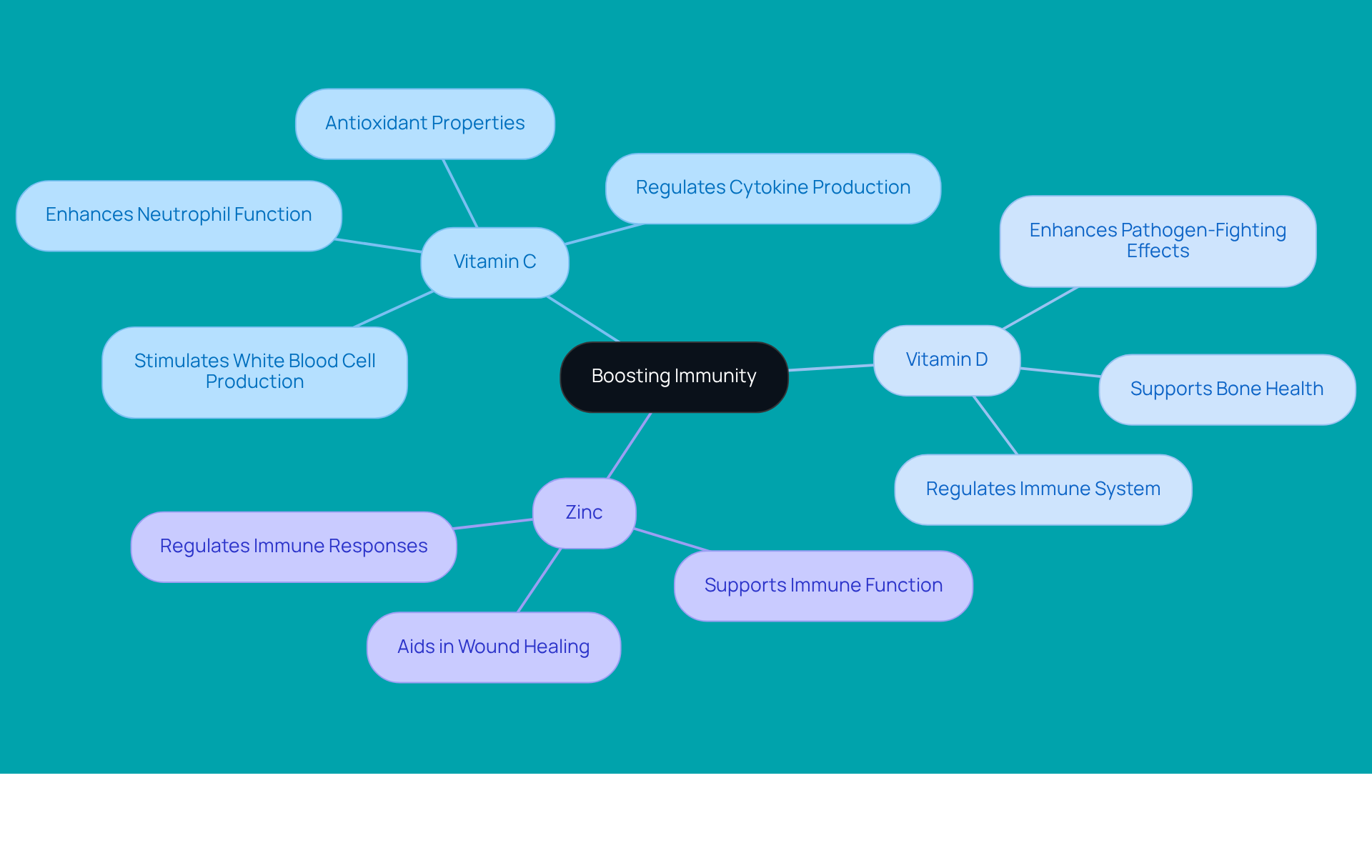
Gummy vs. Tablet Multivitamins: Which is Better for Your Child?
Gummy vitamin supplements have become increasingly popular among children as a multivitamin for kids, largely due to their delightful candy-like taste and chewy texture. These qualities not only enhance their appeal but also encourage regular consumption. However, as caring parents, it's important to be aware that many of these gummies contain added sugars—often ranging from three to five grams per gummy—which can affect daily sugar consumption limits.
Moreover, gummy supplements may not provide as many nutrients as traditional tablet forms. Tablets typically deliver a more concentrated dose of essential vitamins and minerals without the extra sugars. Additionally, gummy vitamins can be more vulnerable to moisture, which may diminish their effectiveness over time.
When , parents should thoughtfully consider their child's preferences and dietary needs when selecting a multivitamin for kids. You might be wondering how to make the best choice. Consulting with a pediatrician and carefully reading labels can ensure that the selected multivitamin for kids promotes consistent intake while effectively meeting your child's nutritional requirements.
Ultimately, the best choice is one that balances taste with health considerations. Together, we can make informed decisions that support our children's well-being and encourage healthy habits for a brighter future.

Understanding Dosage: How Much Multivitamin is Enough?
Understanding the right dosage of multivitamin for kids is crucial. It varies based on age, eating habits, and individual nutritional needs. Typically, you'll find the recommended dosage clearly indicated on product labels. As caring parents, it's essential to follow these guidelines to avoid exceeding the suggested amounts. For instance, did you know that children aged 9 years and older can safely take up to 4,000 IU of vitamin D daily? However, larger doses should only be given under medical supervision.
You might be wondering how to navigate this complex landscape while . Consulting with a healthcare expert can provide personalized recommendations for a multivitamin for kids that are tailored to your child's health and dietary intake. This is especially important considering that around 18% of youth in the U.S. who use nutritional supplements do so under the guidance of a healthcare professional. This highlights the importance of expert oversight in ensuring safe supplementation practices.
It’s vital to ensure that our youngsters receive the right amount of nutrients, and a multivitamin for kids can help prevent potential toxicity from excessive supplementation. Therefore, monitoring your child's intake closely is essential. As a practical suggestion, take the time to regularly assess your child's eating habits. A conversation with a healthcare professional can help ensure they are safely meeting their nutritional needs. Together, we can support our children’s health and well-being on their journey to a brighter future.

Consulting Healthcare Professionals: A Crucial Step Before Supplementing
Before incorporating multivitamins into your child’s routine, it’s important to consider the advice of healthcare professionals, such as pediatricians or registered dietitians. These specialists can thoroughly evaluate your child’s nutritional intake through assessments like food recalls and growth evaluations. This process helps in identifying any possible deficiencies and suggesting the right supplementation. They can also guide you on the best products to choose and monitor for any side effects. This step is essential to ensure that your child’s health needs are met safely and effectively.
Imagine if you could have peace of mind knowing that your child is receiving the right nutrients. Studies show that over 60% of parents seek advice from healthcare experts about their children’s nutrition, underscoring the importance of professional guidance in fostering healthy eating habits. It’s crucial for healthcare providers to assess nutritional status regularly during childhood and to support parents in cultivating lifelong healthy eating practices.
Iron, for instance, is a vital nutrient for young individuals, and addressing its intake is key to their overall nutritional needs. With rising rates of obesity among children and the associated health risks, becomes even more essential in nurturing healthy dietary habits. Together, let’s prioritize your child’s health and well-being by making informed choices.
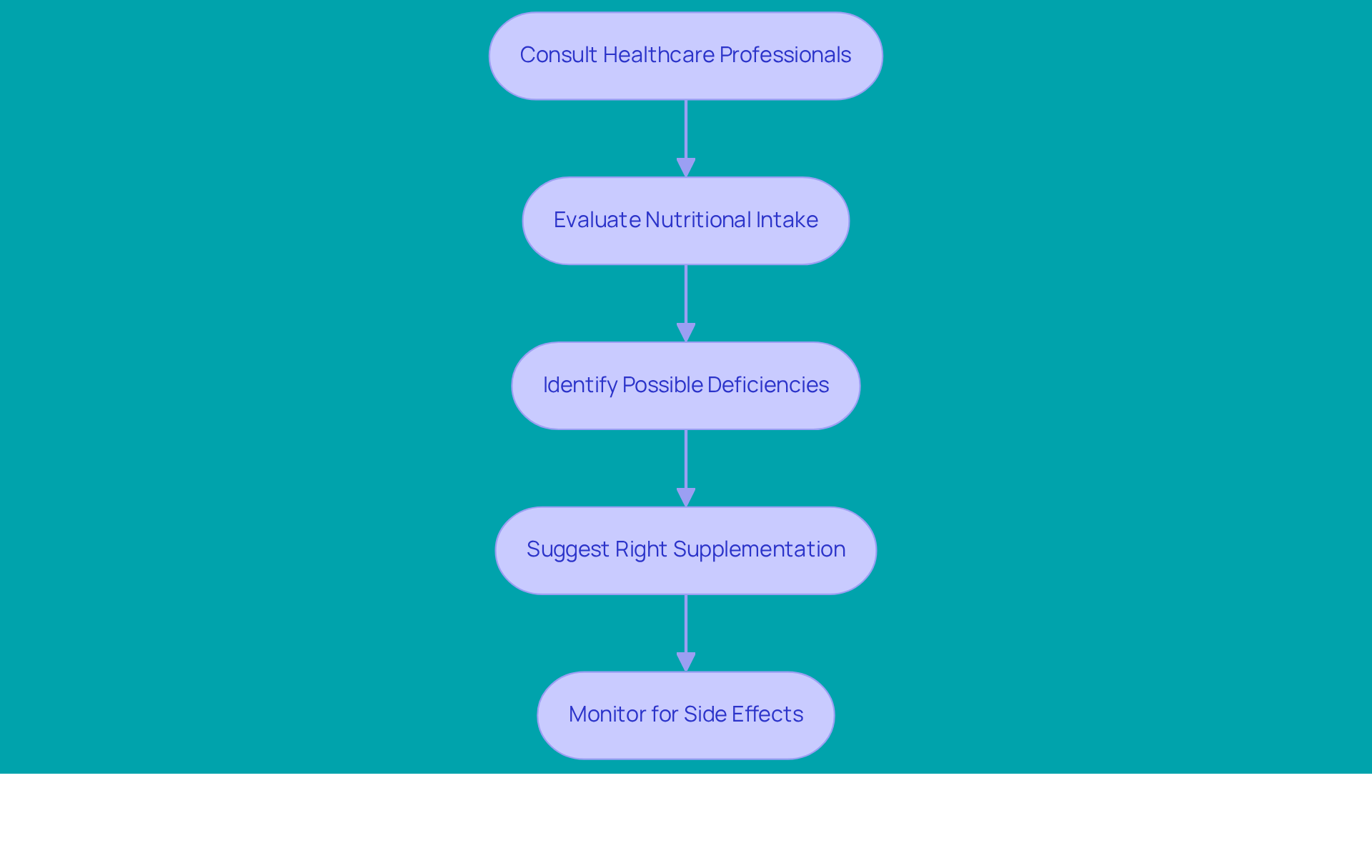
The Importance of a Balanced Diet: Complementing Multivitamins for Optimal Health
While multivitamins can certainly provide essential nutrients, it's important to remember that they should not replace a balanced diet. Imagine a diet rich in fruits, vegetables, whole grains, lean proteins, and healthy fats—this is vital for the overall health and development of our young people. Yet, research indicates that over half of American youth still struggle with poor quality diets. This highlights the urgent need to promote healthy eating habits from a young age.
You might be wondering about the statistics: in Wales, are classified as overweight or obese. This underscores the necessity of prioritizing whole foods alongside supplementation. A multivitamin for kids can play a role, but it should complement a nutritious diet, filling in any gaps where necessary.
By addressing potential barriers to healthy eating—like reliance on fast food due to shift work and a lack of cooking skills—parents can lay a strong foundation for lifelong wellness. Together, we can ensure that our children receive the comprehensive nutrition they need to thrive. Let's take this journey towards healthier eating habits, supporting one another along the way.
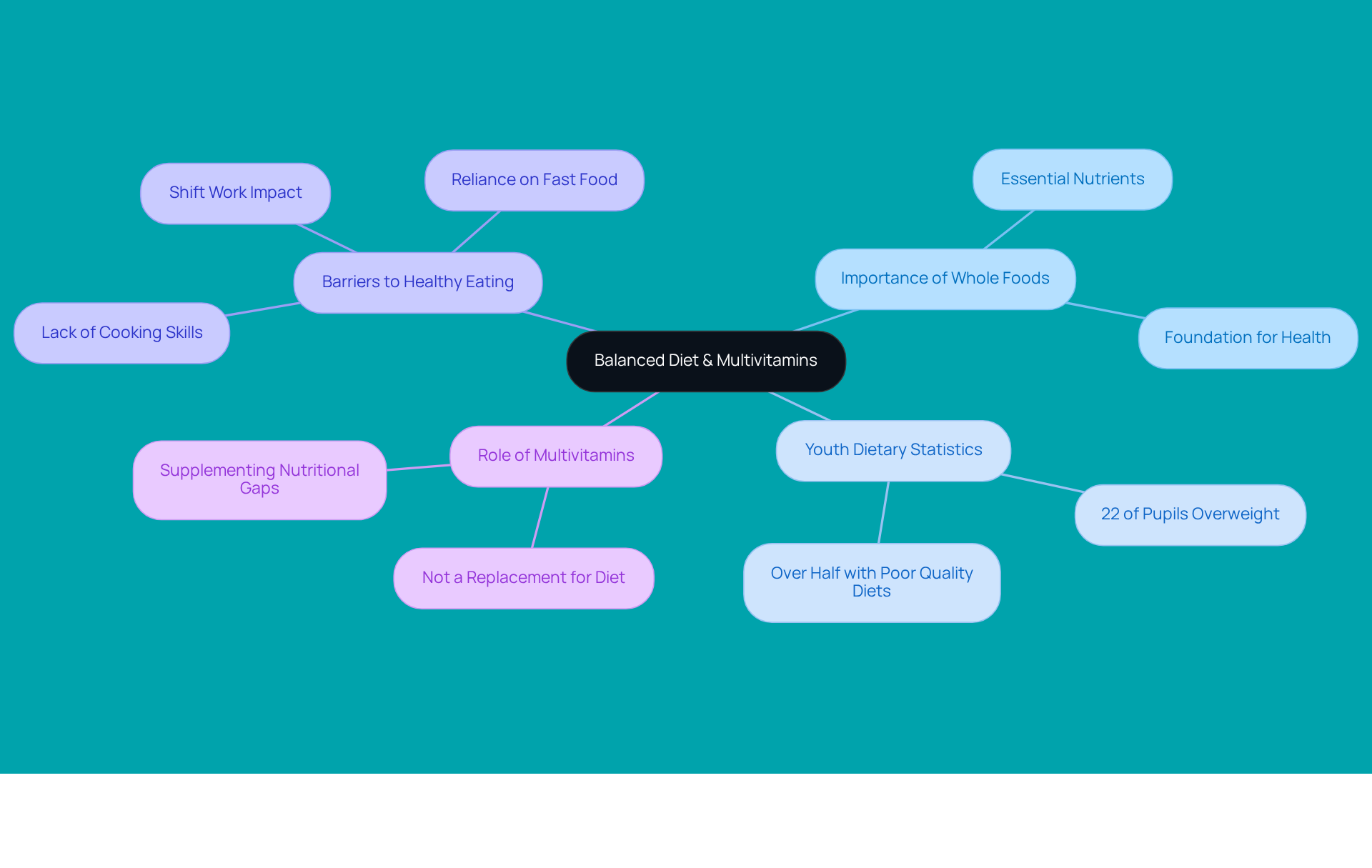
Conclusion
Incorporating multivitamins into a child's diet can significantly support their overall health and development. These supplements offer a practical solution for parents who are striving to fill nutritional gaps that may arise from selective eating habits or busy lifestyles. By providing essential vitamins and minerals, multivitamins help ensure children receive the nutrients necessary for their growth, cognitive function, and immune health.
Imagine if you could effortlessly enhance your child's nutrition. Key insights throughout this article highlight the importance of selecting high-quality multivitamins that contain vital nutrients such as vitamins A, C, D, and minerals like calcium and iron. You might be wondering about the necessity of consulting healthcare professionals before starting any supplementation. This step allows for personalized recommendations based on each child's unique dietary needs.
Furthermore, let's consider the advantages and disadvantages of gummy versus tablet forms of multivitamins. It's essential to ensure that you are well-informed about your options. Ultimately, the journey towards optimal child nutrition involves a balanced approach that combines healthy eating with appropriate supplementation. By prioritizing whole foods alongside multivitamins, we can lay a strong foundation for our children's lifelong wellness.
Together, let's foster healthy habits and make informed choices that empower our children to thrive in every aspect of their lives.
Frequently Asked Questions
What are It Works! multivitamins for kids?
It Works! multivitamins are dietary supplements designed specifically for children to provide essential nutrients necessary for their growth and development, crafted with high-quality, natural ingredients.
Why are multivitamins important for children?
Multivitamins help fill nutritional gaps caused by selective eating or busy schedules, ensuring children receive vital nutrients that support their overall health and well-being.
What key nutrients are typically found in children's multivitamins?
Children's multivitamins usually include vitamins A, C, D, E, several B vitamins, and important minerals such as calcium, iron, and zinc, all of which support various aspects of health, including vision, immune function, and bone strength.
How can parents ensure the multivitamins are safe and effective for their children?
Parents are advised to consult with pediatricians before introducing multivitamins into their child's routine to ensure a safe and effective approach to nutrition.
What percentage of children and adolescents in the U.S. take dietary supplements?
Approximately 34% of U.S. children and adolescents aged 19 years and younger take dietary supplements, indicating a common reliance on these products to meet nutritional needs.
Do all children need multivitamins?
Not all children require multivitamins; most healthy children with a varied diet do not need them. However, children with picky eating habits or restrictive diets may benefit from supplementation to bridge nutritional gaps.
What should parents consider when deciding on vitamin supplements for their children?
Parents should evaluate their child's dietary habits and specific nutritional needs, and consult a pediatrician if considering supplements, especially for children with health concerns.



